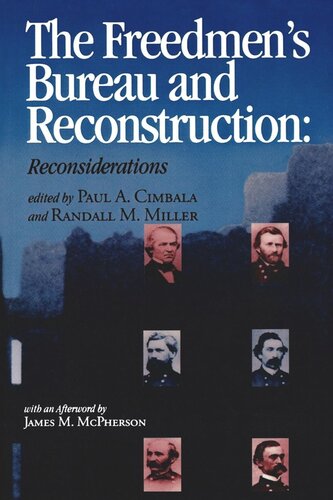

Most ebook files are in PDF format, so you can easily read them using various software such as Foxit Reader or directly on the Google Chrome browser.
Some ebook files are released by publishers in other formats such as .awz, .mobi, .epub, .fb2, etc. You may need to install specific software to read these formats on mobile/PC, such as Calibre.
Please read the tutorial at this link: https://ebookbell.com/faq
We offer FREE conversion to the popular formats you request; however, this may take some time. Therefore, right after payment, please email us, and we will try to provide the service as quickly as possible.
For some exceptional file formats or broken links (if any), please refrain from opening any disputes. Instead, email us first, and we will try to assist within a maximum of 6 hours.
EbookBell Team

4.4
72 reviewsThe Freedmen’s Bureau and Reconstruction: Reconsiderations addresses the history of the Freedmen’s Bureau at state and local levels of the Reconstruction South. In this lively and well-documented book, the authors discuss the diversity of conditions and the personalities of the Bureau’s agents state by state. They offer insight into the actions and thoughts, not only of the agents, but also of the southern planters and the former slaves, as both of these groups learned how to deal with new responsibilities, new advantages and disadvantages, and altered relationships.
The period of Reconstruction was a troubling time in the history of the South. The Congress of the United States passed laws and the President issued edicts, but more often than not, the results of Reconstruction in a particular area depended primarily on the character and personality of an individual Bureau agent. The agents were on the front line of this postwar battle against hatred, bigotry, fear, ignorance, and helplessness. This work presents accounts, often in their own words, about how the agents and officers of the Freedmen’s Bureau reacted to the problems that they faced and the people with whom they dealt on a day-to-day basis.
Although the primary intent of Professors Cimbala and Miller is to enhance the research on post–Civil War Reconstruction and the role of the Freedmen’s Bureau for the benefit of historians, the book is a good read for any lover of American history or armchair psychologist. Also, it has social value regarding the roots of the hatred, violence, and bigotry between the races that has come down through the generations to the present day. We are all products of our history, whether we are white or black, southern or northern. Only through an understanding of this history can we better approach the problems that remain to be solved.